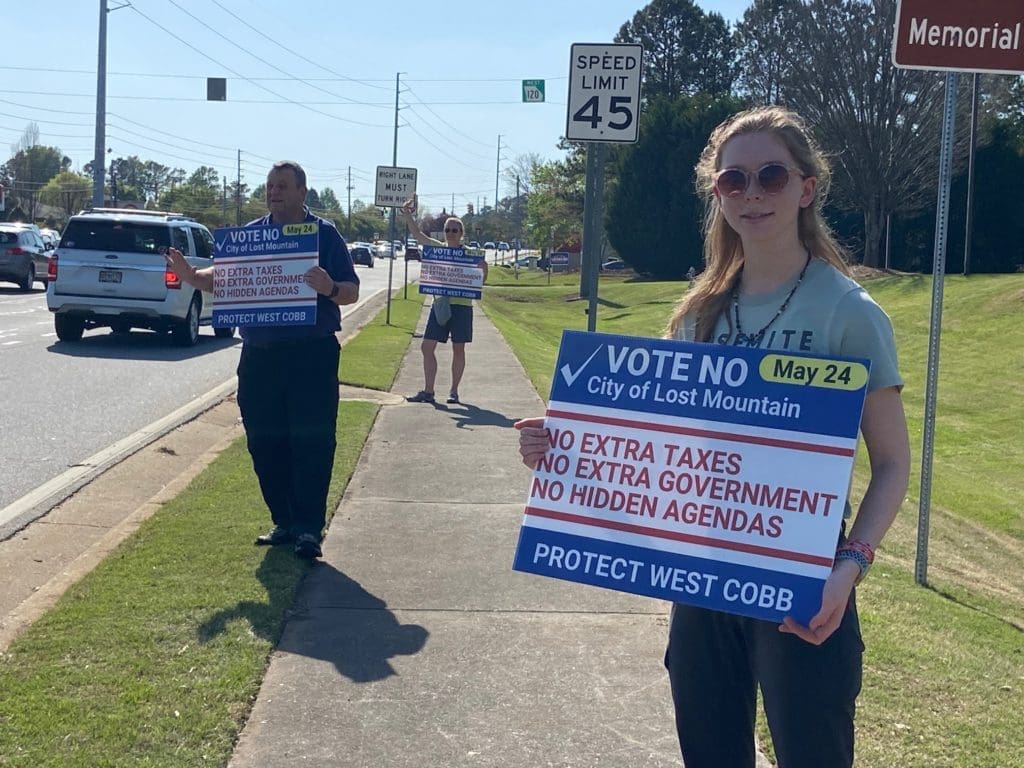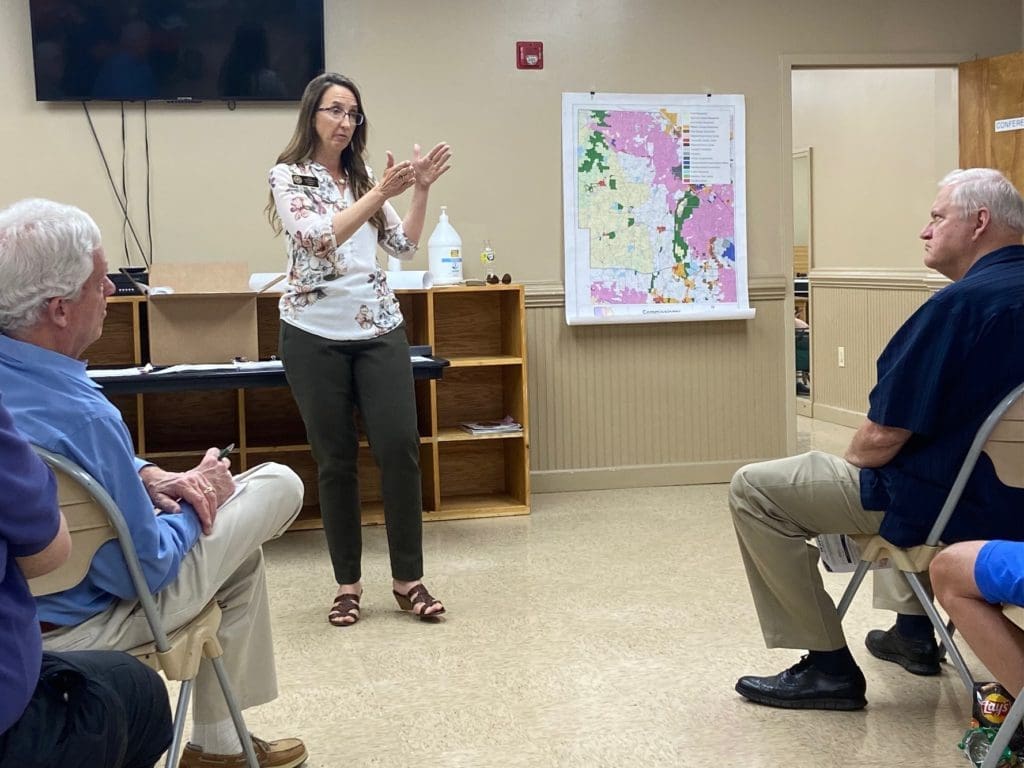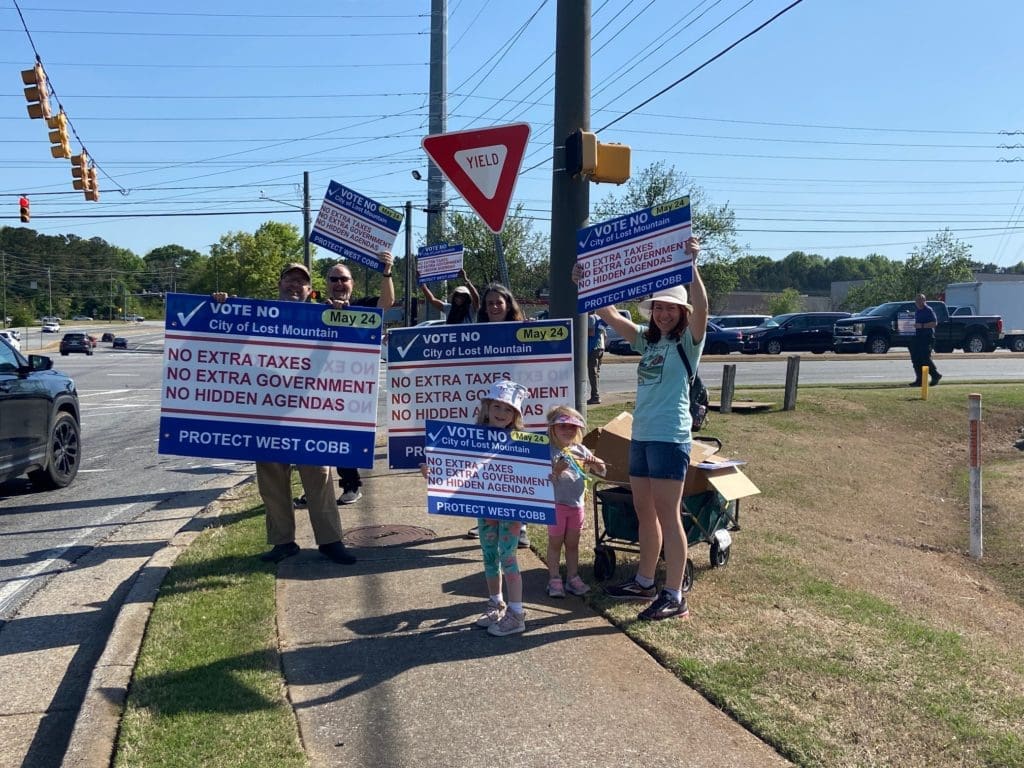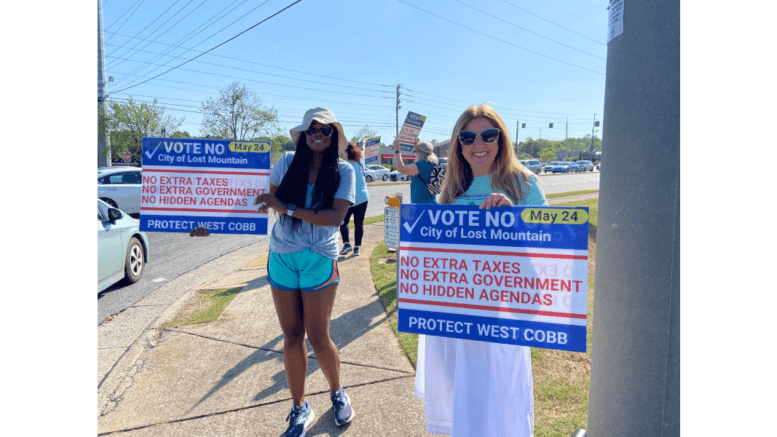By Rebecca Gaunt
[Editor’s note: After the publication of this article a representative from Protect West Cobb reached out to us with a request to clarify that Protect West Cobb is not affiliated with the lawsuit.
Here is a quote she provided from that organization’s Facebook page:
In light of recent media coverage regarding the lawsuit filed to block the City of Lost Mountain referendum, we’d like to share Protect West Cobb Coalition’s stance. We strongly believe that every voter deserves to have the opportunity to cast their ballot regarding this referendum and prefer the voters to have the final say. We have full faith in the democratic process and believe that with our grassroots efforts, this referendum will be defeated at the polls.
As the May 24 referendum approaches, the Lost Mountain cityhood debate is heating up, with opponents calling it an unconstitutional “bait and switch.”
“They’re saying, ‘we’re going to give you four services,’ and the [Georgia] Constitution says you can’t do that,” said West Cobb Advocate founder Melissa O’Brien.
West Cobb Advocate, a non-partisan organization, hosted an open meeting Sunday afternoon at Ward Recreation Center in Powder Springs. Allen Lightcap, the Vinings attorney who filed three lawsuits challenging the charters for Vinings, East Cobb and Lost Mountain, was there to answer questions about the basis of the lawsuit.

The lawsuit alleges that the Lost Mountain city charter violates the Georgia Constitution. Specifically, Article IX, section II, paragraph III.
By proposing the city lite model, with powers granted to the city restricted, Lightcap said it violates Georgia’s principle of home rule. Those powers can only be restricted by general law and applied to the entire state, not by a local law, which is limited to a specific area.
“The Constitution is on my side,” Lightcap said.
Advocates for Lost Mountain cityhood say it will provide the local control needed to keep out high-density housing and crime, protect greenspace and prevent overcrowded schools – all with no tax increase. To keep costs low, it will only provide planning and zoning, sanitation, code enforcement, and parks and recreation. Other services will still come from the county, including emergency services and schools.
Opponents say another layer of government isn’t needed. Nor do they believe it won’t result in additional costs to residents.

Sunday’s cover story by Brian Eason in the Atlanta Journal-Constitution poked holes in bill sponsor Rep. Ginny Ehrhart’s (R-west Cobb) cityhood sales pitch.
For one thing, District 1 Cobb Commissioner Keli Gambrill, a Republican on the Democrat-led board, has never been outvoted on zoning matters in her district, according to the AJC, which reviewed more than 200 cases since the Cobb Board of Commissioners lost its Republican majority in 2021.
Dora Locklear, who took over as West Cobb Advocate Chair since O’Brien moved to Marietta,said shedid her own digging on Gambrill’s record. After she attended three pro-cityhood meetings where it was said that Gambrill was being outvoted, she showed up at the fourth with documents that said otherwise.
“If we don’t stand up and do something about it, we will continue to be lied to,” Locklear said.
An anecdotal story Ehrhart has shared about a commercial rezoning case with the potential to put a gas station next to a residential neighborhood also leaves out the ending–Gambrill won.

Gambrill, who is unopposed for re-election, attended Sunday’s meeting to answer questions about zoning and land use. Though she has not taken a stance on cityhood, she does defend her record representing west Cobb on the board of commissioners since she was elected in 2018.
Gambrill acknowledges there has been growth, but she doesn’t like variance requests.
“You aren’t seeing the yellow signs and that is because they are going in and developing the land as zoned,” she said.
“As far as me getting outvoted, my fellow board members respect that aspect [her adherence to code]. And they also know that when they deviate really far, I’m going to vote no,” Gambrill told the audience.
She added that because of sewer infrastructure issues, the area is seeing more properties developing on two-acre lots instead of one.
“That is what we want,” she said.
Audience members asked Gambrill questions about some of the issues driving the push for cityhood. Low-income housing is one.
“HUD housing, or section 8 housing, is a voluntary program that the landlord has to enter into with the federal government. The county cannot force a landowner to enter into section 8, or HUD housing…the county has no say in it. Yes, the county is the source that gets federal funding. We get those funds, then we give it to the CDBG, which is community development block grants, and from there, they distribute it,” she said.
As far as concerns about an Amazon facility being built, she said west Cobb does not have the necessary infrastructure or zoning categories.
“We’re not going to get any major road widening improvements. Mars Hill isn’t going to be widened. Dallas Highway isn’t going to be widened. We will always have the bottleneck of the mountain, which is going to slow down transportation in that regard,” she said..
On April 13, cityhood proponents posted on their Facebook page:
“It’s already starting. Yesterday, the Board of Commissioners led by Lisa Cupid outvoted our Commissioner in a move toward the new Unified Development Code that will completely replace our existing zoning codes and will not include protections for suburban areas like West Cobb.”
When asked about the UDC on Sunday, Gambrill said she doesn’t expect it to change zoning codes. She, along with Commissioner JoAnn Birrell, did vote against it, but that’s because she thought it could have been done in house, rather than contracted out.
She also said she has not received applications for apartment projects, and when The Avenue West Cobb on Dallas Highway wanted to add them, developers were told it didn’t fit the area.
Terrell Downing has lived in West Cobb since 1989. He waved a sign urging people to vote no to cityhood Friday at the intersection of Barrett Parkway and Dallas Highway.
“One of the biggest reasons for me is: tell me an abstain vote is a yes vote? To me that rolls out the red carpet for corruption…that plus the fact that there were no publicly advertised meetings before the bill went to the state legislature. There are plenty of meetings now that they need the vote, but there were no publicly advertised –it was all invite only, select few, but not for the mass citizens,” he said.
As the city’s charter is written, if a member of the city council abstains from a vote, it automatically counts as a yes. Cityhood proponents have countered the argument against this by saying that if there is a conflict of interest, members will recuse themselves. But opponents point out that the recusal process isn’t in the charter. It won’t be created until the city is incorporated.
Downing said he isn’t anti-cityhood, but he’s opposed to this particular bill, which he believes should have had public input.
“I’m a conservative. I know the support groups are trying to make this a Democratic-Republican issue. It’s not,” he said.
Another detail that has drawn backlash is Ehrhart’s link to the Taylor English law firm, led by her husband and former state representative Earl Ehrhart, which represented developer Pulte Homes when it requested to build a subdivision with more density than permitted in west Cobb.
Ehrhart told the AJC that had nothing to do with her, but it’s not the first time the Taylor English connection has raised scrutiny.
Last year, the Cobb County School Board hired Taylor English to assist in drawing maps for redistricting. Democratic board members Charisse Davis, Jaha Howard and Tre’ Hutchins opposed the move asking for a competitive bidding process to take place and stating they did not believe the firm would deliver non-partisan maps. Randy Scamihorn, who was chair at the time, moved ahead with the vote, which was approved 4-3 along partisan lines. Ginny Ehrhart has long been very vocal with her opposition to the Democrats on the school board, including penning an editorial blasting them for requesting a special accreditation review.
Ehrhart sponsored the resulting school board redistricting map in the legislature. In March, Gov. Brian Kemp signed it into law.
Other leaders of the cityhood movement, listed on the website, have links to the real estate and construction industries, which also has opponents calling foul.
An attendee asked what would happen if the lawsuit doesn’t receive the requested emergency injunctive relief in time to stop the referendum and it’s found unconstitutional after the fact.
“We are entering into uncharted waters. I’m doing my best to stand up for what the plain language of the Constitution says,” Lightcap said.
Preserve West Cobb Citizens Alliance, the group advocating for cityhood, was asked for comment, but hadn’t responded by publication.
The Courier reached out to Ehrhart for a previous story on cityhood and did not receive a response.


Preserve West Cobb, the group who is FOR creating the city, unerstands that it’s better to have six elected, accountable city council members representing ALL of the people of west Cobb, with a population of around 80,000 and growing. The effort was started by longtime residents of the historic area just NW of Atlanta who realized we’ve grown too fast for our current county commission control. Currently, we can claim only ONE out of FIVE county commissioners representing our interests, with the others living quite far away from our area and working on behalf of OTHERS, their own constituents. They are politicians we cannot vote for or against — and they are making decisions for us and impacting our greatest investments, our homes and businesses. We propose to change this unfair, unjust system by a referendum that allows the people to vote on what kind of government will control them, a uniquely American vote! Will we choose to keep our one measly vote on the commission in a county of almost a million people, a system that enables uncaring reps to allow bright green buildings and a laundry mat on every corner? (That’s maybe fine in South Beach, but NOT in our unique community). Or will we create a council of six people who live here, within the city boundaries who have to look their neighbors in the eye every time they vote to destroy ten acres of trees or raise our taxes? Local, accountable government is the foundation of the American way, and the people who are against this effort are too short sighted and ignorant of the way government works to see the benefits of actually having access to their political reps vs. what we have now, which is a commission that has no idea of our needs, but only wants our tax dollars. A former newspaper columnist who lives in west Cobb, I’m voting YES for better representation, better accountability and a better future for our very unique, historic community.
What a fear mongering comment made here. You show short sightedness by not realizing adding more government is never the answer and somehow disguise this as local control.